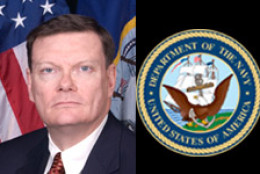Defense
-
Spending on conferences is among first casualties as various defense components make cutbacks. DoD's online meeting service is suffering from its own popularity.
January 31, 2013 -
Alan Paller of the SANS Institute talks about DoD's new initiative to hire 4,000 more people for its Cyber Command. Paul Terry of Blackboard, Inc., discusses how his company is helping GSA with its travel planning. Devon Hewitt, a partner at Protorae Law, weighs in on a recent contract award protest affecting people with disabilities. Capt. Paul Hammer of the Defense Centers of Excellence for Psychological Health and Traumatic Brain Injury, talks about the latest efforts at his center. Robin Lineberger of Deloitte LLP fills us in about the Professional Services Council's new commission that's focusing on efficient and innovative acquisition issues.
January 29, 2013 -
Eric Green of NIH talks about his agency's search for a top data scientist. Dr. Elizabeth Stanley of Georgetown University discusses a new meditation program she helped develop for the Marine Corps. David Capozzi of the Access Board discusses new access standards for agencies. William Pretzer of the National Museum of African American History and Culture talks about trolling the inauguration for presidential memorabilia.
January 28, 2013 -
DoD's operations and maintenance accounts will likely be hit first if sequestration goes into effect. Unlike its procurement and research and development activities, which can continue to function on funds obligated in prior years, O&M dollars generally get spent right away. In preparation for sequestration, the Pentagon has already let go of tens of thousands of temporary hires and is drawing up a contingency plan for one-day-a-week furloughs. Deputy Secretary Ashton Carter says the unpaid furloughs would begin in April and continue through the remainder of the fiscal year if sequestration is not avoided.
January 28, 2013 -
News and buzz in the acquisition and IT communities that you may have missed this week.
January 25, 2013 -
On Thursday, DoD eliminated its Clinton-era policy that excluded women from serving in many front-line jobs. But full implementation will not happen immediately.
January 25, 2013 -
The Air Force said it has identified 59 victims at a basic training facility. Thirty-two instructors are among those who have been accused or convicted of committing sexual improprieties with trainees. Senior leaders say they must do more to stop the problem.
January 24, 2013 -
The Army has put an immediate freeze on civilian hiring and will begin terminating some temporary employees to reduce spending ahead of potential across-the-board budget cuts later this year. Army Chief of Staff Ray Odierno and Army Secretary John McHugh also directed Army commanders and supervisors to reduce base-operations support spending.
January 18, 2013 -
Robert Work, the Navy's undersecretary, will not serve a second term under President Obama.
January 18, 2013 -
Robert Work, the undersecretary of the Navy, says forget about the Reagan-era aspirations of a 600-ship fleet. Even with a smaller Navy, things are better than ever, he says, even if they're about to get worse due to smaller budgets and the threat of sequestration. "Yes, things might get worse. In fact, they probably will get worse. But this is the heyday of the U.S. Navy. And, if you're not excited, you ain't breathing," he said at the Surface Navy Association's annual symposium this week.
January 18, 2013 -
The Department of the Navy is finding real dollar savings by moving to enterprise software licenses, managing mobile devices and services better and reducing the number of printers and the amount printed. Terry Halvorsen, the DoN CIO, said they are on track to meet the goal of cutting 25 percent of their IT budget in five years. January 17, 2013
January 17, 2013 -
Paul Mehney is with the Army's office of System of Systems Integration. In this week's edition of On DoD, he fills us in in what the Army's planning for the next NIE, and what it's learned from the unorthodox testing and acquisition process so far.
January 16, 2013 -
The Air Force orders commanders to start cutbacks in advance of the next budget emergency.
January 16, 2013 -
At the end of fiscal year 2012, the Army's vehicle fleet numbered around 70,800 vehicles, which is about 12,000 less than it had in 2009. As it cuts back on the number of overall vehicles it has, the Army is also assembling a greener, more environmentally friendly fleet.
January 15, 2013 -
Martin Libicki of Rand Corp talks about managing cyber attacks. Kevin Brancato of Bloomberg Government discusses the Canada's decision to pass on the F-35. John Templeton of BlackMoney.com talks about being an African American in IT. Belva Martin of GAO discusses the new network communications strategy.
January 14, 2013





